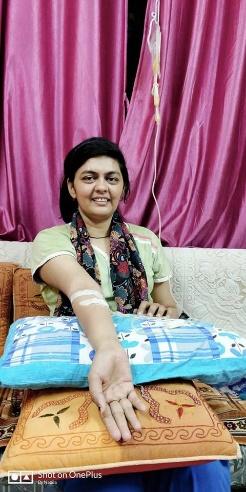The story of Nabila
What is parahemophilia?
It is commonly known as Factor V deficiency (FDV) and is a clotting (or coagulation) disorder where a specific protein is missing from the blood so that injured blood vessels cannot heal in the usual way.
The Factor V protein is a catalyst, accelerating the process by which prothrombin is converted to thrombin, the initial step in clot formation. FDV is usually inherited in an autosomal recessive fashion, meaning both parents must carry the gene to pass it on to their children; it affects men and women equally.
My life with parahemophilia
When I was 8 months old, I fell from the bed which resulted in a cut on my lower lip, causing profuse bleeding. At that time, doctors were not yet aware about hemophilia and its treatment. When my bleeding did not stop, I was brought to the KEM Hospital in Mumbai.
My childhood was never normal. I was not allowed to play outdoors with my friends. When I was four-and-a-half years old, I fell down the stairs and had a bleed on the brain. I was on the verge of death. Doctors in my city refused to handle my case and again, I was taken to the KEM Hospital in Mumbai. The brain bleed affected me, I started to have seizures and I stammered when I talked. I was then referred to a neurologist and for six years placed on medication.
My schooling was carried out under the care of my teachers and principal, after my father gave them guidance and instructions about hemophilia. My principal used to hold my hand and make me sit beside her during lunch break, so that I didn’t run and go and play with friends.
Despite the challenges I have always been determined to complete my education. I graduated with a bachelor’s degree in Commerce and another bachelor’s degree in Education for Teaching. I also received diploma certificates in computer applications. I have worked as a teacher for seven years in a renowned school in my city. Currently I work with an IT firm as a quality assurance officer and content writer.
My involvement with the hemophilia community – helping to educate and raise awareness
My father became President of the Hemophilia Society Ahmedabad Chapter in 1999. He continues to serve and work with the hemophilia community. I joined the executive committee of this society in 2002. Many challenging circumstances have come into my life, but my work with the bleeding disorders community makes me feel more confident and independent.
The organisations within the bleeding disorder community are making important strides in addressing women and bleeding disorders. My mission is to find other women who are struggling with hemophilia or other bleeding disorders in my community. I want to educate and acknowledge them with respect, making sure they know “women can be the bleeders too.” I want to show women how magnificent they are, and to inspire them to step up and grab the life they’ve dreamed about with both hands.
A few months ago, I had an allergic reaction to my treatment of fresh frozen plasma, a plasma protein allergy. My hematologist said there is no remedy. I would be lying if I said that I am not worried, grinding my teeth, and flying into rages. Recently on 14th November, I got acute pain due to an ovarian cyst, but I was afraid of having an FFP transfusion, so I took oral medication. This was not a major pain, but I am afraid what to do in case of a major episode. This is my medical condition.
Dealing with any chronic illness can be anxiety-inducing and isolating when others don’t understand. It is very discouraging when we people with such deficiencies can no longer live a ‘normal’ life, but we ‘look normal’ to the world. Due to hemophilia I face many personal problems in my life, but I face them with strength and I am focused on making my future bright.
Since 2013 I have been working voluntarily for the Hemophilia Federation (India) in communications, heading the women’s group. The federation is affiliated to the World Federation of Hemophilia who are based in Montreal, Quebec.
I was the girl who was not allowed to travel alone. Even though there is no factor 5 concentrate available and there is only FFP treatment, I have travelled solo to the UK, US and the Philippines, attending meetings and congresses on hemophilia.
There is a lot going on right now in life. But we (rare factors deficient) must make our self-care a priority. In order to be useful, and in order to create the world we want to live in, we must look after ourselves. My hope for the future is to be an example to other female bleeders, to strive and help others.
Let’s shine a light on patients with rare bleeding disorders and demonstrate the needs and concerns.
